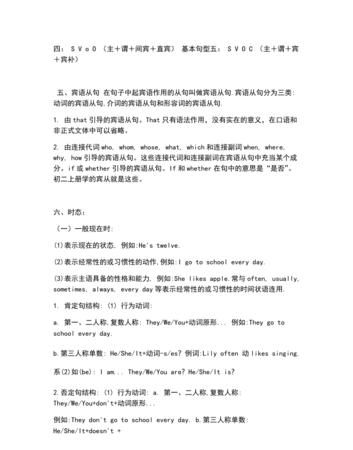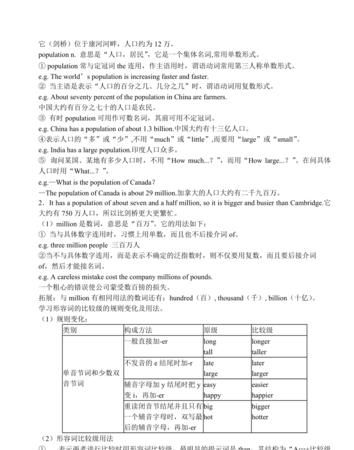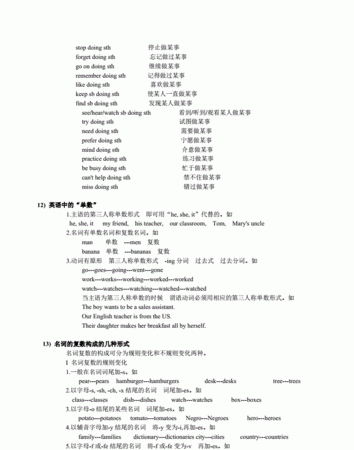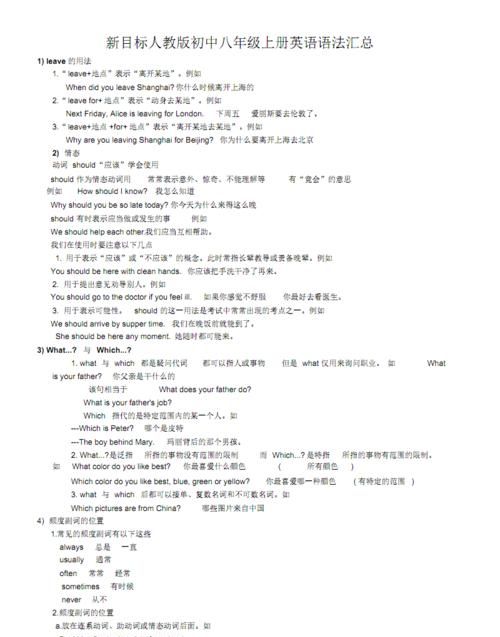本文目录
八年级英语上册语法知识点归纳总结
人们很难接受与已有知识和 经验 相左的信息或观念,因为一个人已有的知识和观念都是经过反复筛选的。接下来我给大家分享关于 八年级 英语上册语法知识,希望对大家有所帮助!
八年级英语上册语法知识1
1. 形容词/副词的比较级和最高级的构成规则
(1)单音节词和少数以-er,-ow结尾的双音节单词,比较级在后面加-er,最高级在后面加-est。
① 单音节单词
small→smaller→smallest
short→shorter→shortest
tall→taller→tallest
great→greater→greatest
② 少数以-er,-ow结尾的双音节单词
clever→cleverer→cleverest
narrow→narrower→narrowest
(2)以不发音e结尾的单音节单词,比较级在原形后加-r,最高级在原级后加-st。
large→larger→largest
nice→nicer→nicest
able→abler→ablest
(3)以一个辅音字母结尾的闭音节(即:辅音+元音+辅音)单词中,先双写末尾的辅音字母,比较级加-er,最高级加-est。
big→bigger→biggest
hot→hotter→hottest
fat→fatter→fattest
(4)以“辅音字母+y”结尾的双音节词, 把y改为i,比较级加-er,最高级加-est。
easy→easier→easiest
heavy→heavier→heaviest
busy→busier→busiest
happy→happier→happiest
(5)其他双音节词和多音节词,比较级在前面加more,最高级在前面加most。
beautiful→more beautiful→most beautiful
different→more different→most different
easily→more easily→most easily
(6)有少数形容词、副词的比较级和最高级是不规则的,必须熟记。
good→better→best
well→better→best
bad→worse→worst
ill→worse→worst
old→older/elder→oldest/eldest
many/much→more→most
little→less→least
far →further/farther→ furthest/farthest
2. 形容词和副词比较级的用法
(1)“甲+be+(倍数)+形容词比较级+than+乙”表示“甲比乙…”或“甲比乙…几倍”。
Tom is taller than Kate.
汤姆比凯特高。
This room is three times bigger than that one.
这个房间比那个大三倍。
(2)“甲+实意动词+(倍数)+副词比较级+than+乙”表示“甲比乙…”或“甲比乙…几倍”。
I got up earlier than my mother this morning.
我今天早晨起床比我妈妈还早。
He runs three times faster than his brother.
他跑的速度比他弟弟快三倍。
3. 形容词和副词最高级的用法
(1)“主语+be+the+形容词最高级(+单数名词)+in/of...”表示“……是……中最……的”。
Tom is the tallest in his class./of all the students.
汤姆是他们班上/所有学生当中最高的。
This apple is the biggest of the five.
这个苹果是五个当中最大的。
(2)“主语+实意动词+(the)+副词最高级+in/of...”表示“……是……中最……的”。
I jump (the) farthest in my class.
我是我们班跳得最远的。
八年级英语上册语法知识2
1.主语: 句子 所陈述的对象。
2.谓语:主语发出的动作。一般是有动作意义的动词。
3. 宾语:分为动词宾语和介词宾语,属于动作的承受者。
4. 系动词:表示状态或状态变化的动词,没有实际的动作意义。如 be, 感官系动词(look, sound, smell, taste 和 feel)、保持类系动词(keep, stay 和 remain)、状态变化类系动词(become、get、turn 和 go)等。
5. 表语:紧跟系动词后面的成分。
6. 定语:修饰名词或代词的成分。
7. 状语: 修饰形容词、副词、动词或句子的成分。
8. 补语:分为宾语补足语和主语补足语。是对宾语和主语的补充说明,与其有主动或被动的逻辑关系。
例如:You should keep the room clean and tidy.
你应该让屋子保持干净整洁。
(You是主语, should keep是谓语,the room是宾语,clean and tidy是宾语补足语。)
This kind of food tastes delicious.
这种食物吃起来很可口。
(This kind of food是主语, tastes是系动词, delicious是表语。)
注意:主语、谓语、宾语、系动词、表语、补语是一个句子的主干成分;定语和状语是一个句子的修饰性成分,不是主干成分。
八年级英语上册语法知识3
1.“主语 + 谓语”(即“主谓”句型)
例:They arrived in Harbin yesterday morning.
分析:“they”(主语)“arrived”(谓语)。
2.“主语 + 谓语 + 宾语”(即“主谓宾”句型)
例:I study English.
分析:“I”(主语)“study”(谓语动作)“English”(宾语即动作涉及的对象)。
3.“主语 + 谓语 + 间接宾语 + 直接宾语”(即“主谓双宾”句型)
例:Our teacher taught us English.
分析:“our teacher”(主语)“教”(谓语动作)“us”(间接宾语)“English”(直接宾语)。
4.“主语 + 谓语 + 宾语 + 宾语补足语”(即“主谓宾宾补”句型)
例: He asked her to go there.
分析:“he”(主语)“asked”(谓语动作)“her”(宾语即动作涉及的对象)“to go there”(补语—补充说明宾语做什么)。
5.“主语 + 系动词+ 表语”(即“主系表”句型)
常用的系动词有be, keep,lie, remain, stand, become, fall, get, go, grow, turn, look, feel, seem, smell, sound, taste, 等。
例: I am a teacher. 我是一名老师
分析:“I”(主语)“am”(系动词)“a teacher”(表语—即表明主语的身份)。
八年级英语上册语法知识点相关 文章 :
★ 八年级上册英语语法整理
★ 八年级英语语法知识点归纳总结
★ 初二英语语法知识点汇总
★ 八年级英语上册知识点归纳
★ 八年级英语上册知识点归纳小结
★ 八年级英语语法知识点
★ 最新人教版八年级上册英语知识点
★ 初中八年级英语语法知识点整理
★ 八年级上册英语知识点

八年级上册英语语法知识点归纳总结
知识是一切力量的源泉,是文人骚客抒发豪情壮志的资本;是国家兴旺发达,科学发展的力量源泉;是人们独立于世界 文化 之林的基石,下面我给大家分享一些 八年级 上册英语语法知识,希望能够帮助大家,欢迎阅读!
八年级上册英语语法知识1
形容词/副词的比较级和最高级
1. 形容词/副词的比较级和最高级的构成规则
(1)单音节词和少数以-er,-ow结尾的双音节单词,比较级在后面加-er,最高级在后面加-est。
① 单音节单词
small→smaller→smallest
short→shorter→shortest
tall→taller→tallest
great→greater→greatest
② 少数以-er,-ow结尾的双音节单词
clever→cleverer→cleverest
narrow→narrower→narrowest
(2)以不发音e结尾的单音节单词,比较级在原形后加-r,最高级在原级后加-st。
large→larger→largest
nice→nicer→nicest
able→abler→ablest
(3)以一个辅音字母结尾的闭音节(即:辅音+元音+辅音)单词中,先双写末尾的辅音字母,比较级加-er,最高级加-est。
big→bigger→biggest
hot→hotter→hottest
fat→fatter→fattest
(4)以“辅音字母+y”结尾的双音节词, 把y改为i,比较级加-er,最高级加-est。
easy→easier→easiest
heavy→heavier→heaviest
busy→busier→busiest
happy→happier→happiest
(5)其他双音节词和多音节词,比较级在前面加more,最高级在前面加most。
beautiful→more beautiful→most beautiful
different→more different→most different
easily→more easily→most easily
(6)有少数形容词、副词的比较级和最高级是不规则的,必须熟记。
good→better→best
well→better→best
bad→worse→worst
ill→worse→worst
old→older/elder→oldest/eldest
many/much→more→most
little→less→least
far →further/farther→ furthest/farthest
2. 形容词和副词比较级的用法
(1)“甲+be+(倍数)+形容词比较级+than+乙”表示“甲比乙…”或“甲比乙…几倍”。
Tom is taller than Kate.
汤姆比凯特高。
This room is three times bigger than that one.
这个房间比那个大三倍。
(2)“甲+实意动词+(倍数)+副词比较级+than+乙”表示“甲比乙…”或“甲比乙…几倍”。
I got up earlier than my mother this morning.
我今天早晨起床比我妈妈还早。
He runs three times faster than his brother.
他跑的速度比他弟弟快三倍。
3. 形容词和副词最高级的用法
(1)“主语+be+the+形容词最高级(+单数名词)+in/of...”表示“……是……中最……的”。
Tom is the tallest in his class./of all the students.
汤姆是他们班上/所有学生当中最高的。
This apple is the biggest of the five.
这个苹果是五个当中最大的。
(2)“主语+实意动词+(the)+副词最高级+in/of...”表示“……是……中最……的”。
I jump (the) farthest in my class.
我是我们班跳得最远的。
八年级上册英语语法知识2
句子 成分
1.主语:句子所陈述的对象。
2.谓语:主语发出的动作。一般是有动作意义的动词。
3. 宾语:分为动词宾语和介词宾语,属于动作的承受者。
4. 系动词:表示状态或状态变化的动词,没有实际的动作意义。如 be, 感官系动词(look, sound, smell, taste 和 feel)、保持类系动词(keep, stay 和 remain)、状态变化类系动词(become、get、turn 和 go)等。
5. 表语:紧跟系动词后面的成分。
6. 定语:修饰名词或代词的成分。
7. 状语:修饰形容词、副词、动词或句子的成分。
8. 补语:分为宾语补足语和主语补足语。是对宾语和主语的补充说明,与其有主动或被动的逻辑关系。
例如:You should keep the room clean and tidy.
你应该让屋子保持干净整洁。
(You是主语, should keep是谓语,the room是宾语,clean and tidy是宾语补足语。)
This kind of food tastes delicious.
这种食物吃起来很可口。
(This kind of food是主语, tastes是系动词, delicious是表语。)
注意:主语、谓语、宾语、系动词、表语、补语是一个句子的主干成分;定语和状语是一个句子的修饰性成分,不是主干成分。
八年级上册英语语法知识3
简单句的五种基本句型
1.“主语 + 谓语”(即“主谓”句型)
例:They arrived in Harbin yesterday morning.
分析:“they”(主语)“arrived”(谓语)。
2.“主语 + 谓语 + 宾语”(即“主谓宾”句型)
例:I study English.
分析:“I”(主语)“study”(谓语动作)“English”(宾语即动作涉及的对象)。
3.“主语 + 谓语 + 间接宾语 + 直接宾语”(即“主谓双宾”句型)
例:Our teacher taught us English.
分析:“our teacher”(主语)“教”(谓语动作)“us”(间接宾语)“English”(直接宾语)。
4.“主语 + 谓语 + 宾语 + 宾语补足语”(即“主谓宾宾补”句型)
例:He asked her to go there.
分析:“he”(主语)“asked”(谓语动作)“her”(宾语即动作涉及的对象)“to go there”(补语—补充说明宾语做什么)。
5.“主语 + 系动词+ 表语”(即“主系表”句型)
常用的系动词有be, keep,lie, remain, stand, become, fall, get, go, grow, turn, look, feel, seem, smell, sound, taste, 等。
例:I am a teacher. 我是一名老师
分析:“I”(主语)“am”(系动词)“a teacher”(表语—即表明主语的身份)。
八年级上册英语语法知识4
宾语从句
1. 宾语从句的含义
在主句中做宾语的从句叫做宾语从句。
如:She knew that the teacher had seen the film.
她知道这位老师看过这部电影。
“that the teacher had seen the film”做 knew 的宾语,同时又是由连接词 that 引导的从句,所以它叫做宾语从句。
2. 宾语从句的分类
(1)动词宾语从句:顾名思义,它是位于动词后面的宾语从句。
如:He asked whose handwriting was the best in our class.他问我们班上谁的书法最好。
(2)介词宾语从句:顾名思义,它是位于介词后面的宾语从句。
如:I agree with what you said just now.我同意你刚才说的话。
(3)形容词宾语从句:顾名思义,它是位于形容词后面的宾语从句。
如:I am afraid that I will be late. 恐怕我要迟到了。
3. 引导名词性从句的连接词
(1)that:没有含义,在宾语从句中不做成分
(2)whether/if:表示是否,在宾语从句中不做成分。
I don't know if /whether he still lives here after so many years. 我不知道这么多年后,他是否还住在这里。
(3)连接代词:what, which, who, whom, whose(在宾语从句中做主、宾、表和定语)
连接副词:where, when, how, why(在宾语从句中做状语)
The small children don't know what is in their stockings.(what 在宾语从句中做主语)
这些小孩子不知道什么在他们的长筒袜里。
Could you tell me why you were late for the meeting this morning?(why 在宾语从句中做原因状语)
你能告诉我为什么你今天早上开会迟到吗?
4. 在做宾语从句的题目时应注意两点
(1)时态:
①当主句是现在时态时,宾语从句可以根据需要使用任何时态。
I don't know when he will come back.我不知道他将何时回来。
He tells me that his sister came back yesterday.他告诉我他姐姐昨天回来了。
②当主句是过去时态时,宾语从句必须是一种过去的时态。
She asked me if I knew whose pen it was.她问我是否知道这是谁的钢笔。
He said that he could finish his work before supper.他说他会在晚饭前完成工作。
③当表示客观事实或普遍真理的句子做宾语从句时,任何时候都用一般现在时。
The teacher said that the earth goes round the sun.老师说过地球绕着太阳转。
(2)语序:任何从句都使用陈述句语序,宾语从句当然也不例外。
八年级上册英语语法知识5
现在进行时
现在进行时表示此时此刻正在发生的事情。常与now,at the moment,look,listen等词连用。
The little boy is watching TV now.
这个小男孩现在正在看电视。
Listen!She is playing the guitar in the next room.
听!她正在隔壁房间弹吉他。
现在进行时的基本结构:
肯定式:am/is/are+doing(现在分词)
否定式:am/is/are not +doing(现在分词)
一般疑问式:Am/Is/Are + 主语 +doing(现在分词)+ 其他
特殊疑问式:特殊疑问词+一般疑问式
They’re having a meeting now.
他们现在正在开会。
They aren't having a meeting now.
他们现在没有在开会。
Are they having a meeting now?
他们现在正在开会吗?
What are they doing now?
他们现在正在做什么?
八年级上册英语语法知识点相关 文章 :
★ 八年级上册英语语法整理
★ 八年级上册英语语法知识点复习
★ 初中八年级英语语法知识点整理
★ 初二英语语法知识大全:易错词汇归纳
★ 八年级英语语法知识点归纳总结
★ 初二英语语法知识点汇总
★ 8上英语语法知识
★ 八年级上册英语语法复习资料
★ 八年级上册英语Units1-10单元知识点归纳
★ 八年级英语语法汇总

八年级上册英语语法知识点归纳总结
八年级上册的重要英语语法包括可数名词与不可数名词、宾语从句、被动语态等等。接下来分享具体的八年级上册英语语法,希望对同学们复习有帮助。
可数名词与不可数名词
(一)可数名词
英语中的物质名词大体上可分为可数名词和不可数名词。可数名词指物体的数量可数。其单数形式可在名词前加a或an,表示一个,如a pear. 其复数形式要在词尾加-s,或-es(特殊情况除外),如two bananas, three tomatoes, many apples,a few students
(二)不可数名词
1.不可数名词指物体的数量不可数。不可数名词没有单复数之分,也不能在词前直接加冠词a 或an.表示不可数名词的数量时可在不可数名词前加相应的由量词构成的短语。如a bag of… 2.常见的量词短语有:
a piece of… a cup of… a teaspoon of… a bottle of…
3.不可数名词还可以用下面的词表示数量:much(much rain),
a little (a little milk).
4.既可以修饰不可数名词又可以修饰不可数名词的词有:
Lots of= a lot of许多,大量 some一些(用于肯定句)any一些(用于否定句和一般疑问句)
宾语从句
(一) 宾语从句的语序:
宾语从句的语序是陈述语序,即“连接词+主语+谓语+其它成分”。特别强调:它的主语和谓语的语序是陈述语序,而不是疑问句的倒装结构。
Can you tell me who(m) do we have to see?(╳)
Can you tell me who(m) we have to see?( √)
陈述句变为宾语从句时,要注意人称和时态的变化,语序不变。 eg. She said, “I will leave a message on the desk.” à She said she would leave a message on the desk.
一般疑问句和特殊疑问句变为宾语从句时,也要注意人称和时态的变化,后面接陈述语序。Eg. “Where are the tickets?” I asked him. à I asked him where the tickets are.
(二) 宾语从句的时态呼应:
宾语从句中谓语动词的时态,常常受到主句谓语时态的制约,此为时态呼应。如果主句谓语是一般现在时或将来时,从句谓语的时态不受限制;如果主句谓语的时态是一般过去时,从句一般要随着改为相应的过去时态(一般过去时、过去进行时、过去将来时、过去完成时)。
eg. I thought (that) you are free today. (╳)
I thought (that) you would be free today.(√)
【注意】当宾语从句叙述的是客观真理时,不管主句谓语的时态如何,从句都用一般现在时。
(三) 其他需要说明的问题:
1、 标点由主句决定,如主句是陈述句、祈使句,则用句号;是疑问句则用问号。
eg. I heard she had been to the Great Wall. Can you tell me which bus I should take?
2、 要注意个别句子中主从句人称的一致。
被动语态
(一)被动语态的结构。
被动语态由“助动词be+过去分词”构成,其中be有时态、人称和数的变化。被动语态根据时态的不同,可以分为以下几种类型:
一般现在时:am/is/are +done
一般过去时:was/were+done
现在进行时:am/is/are+being done
过去进行时:was/were+being done
将来时:will/would+be done,be going to be done,be to be done
现在完成时:have/has+been done
过去完成时:had +been done
将来完成时:will+have been done
(二)被动语态的用法。
1.不知道或者没必要指出动作的执行者时,常用被动语态,这时往往不用by短语。用by短语主要是为了突出动作的执行者。
例:The front window in the classroom was broken yesterday.
昨天,教室前窗玻璃被打破了。(这里不知道打破玻璃的人是谁)
History is made by the people.
历史由人民创造。(为了突出动作执行者the people,用了by短语)
2.为了使语言得体或者更圆滑等不愿意说出动作的执行者,那就用被动语态。
例:You are not allowed to bring the dog here.
你在这儿不允许带狗。
3.出于修辞的原因或者为了更好的安排句子。
例:The notion is especially opposed to by those who have invested much in the area. 这个提议特别遭到了那些在本地区投资很大的人的反对。(因those的定语太长了,若用它作主语,主语与谓语就相距太远而显得句子松散。)

人教版八年级上册英语第八单元知识点
多读书,读不同观点的书,能够丰富自己的知识,能够拓宽自己的思路,能够增强自己判断真伪的能力;下面我给大家分享一些八年上册英语的知识,希望能够帮助大家,欢迎阅读!
八年上册英语的知识1
Unit1 Where did you go on vacation?
【重点语法】
不定代词:不指名代替任何特定名词或形容词的代词叫做不定代词。
用法注意:
1. some 和any +可数名/不可数名。
some 多用于肯定句,any多用于否定句、疑问句和条件从句 。有些问句中用some,不用any, 问话者希望得到对方肯定回答。
2. 由some, any, no, every 与 body, one, thing构成的复合不定代词作主语时,其谓语动词用三单。
3. 不定代词若有定语修饰,该定语要置于其后:如:something interesting
【重点 短语 】
1. buy sth for ab./ buy sb. sth 为某人买某物
2. taste + adj. 尝起来……
3. nothing...but + V.(原形) 除了……之外什么都没有
4. seem + (to be) + adj 看起来
5. arrive in + 大地方 / arrive at + 小地方 到达某地
6. decide to do sth. 决定做某事
7. try doing sth. 尝试做某事 / try to do sth. 尽力做某事
8. enjoy doing sth. 喜欢做某事
9. want to do sth. 想去做某事
10. start doing sth. 开始做某事=begin doing sth.
11. stop doing sth. 停止做某事 区分:stop to do sth. 停下来去做某事
12. dislike doing sth. 不喜欢做某事
14. so + adj + that + 从句 如此……以至于……
16. tell sb. (not) to do sth. 告诉某人(不要) 做某事
17. keep doing sth. 继续做某事
18. forget to do sth. 忘记去做某事 / forget doing sth 忘记做过某事
【词语辨析】
1. take a photo/ take photos 拍照
quite a few+名词复数 “许多…”
2. seem + 形容词 看起来…... You seem happy today.
seem + to do sth. 似乎/好像做某事 I seem to have a cold
It seems + 从句 似乎..…. It seems that no one believe you.
seem like ... 好像,似乎….. It seems like a good idea.
3. arrive in +大地点= get to= reach+地点名 “到达......”
arrive at +小地点
(注:若后跟地点副词here/there/home, 介词需省略,如:arrive here; get home)
4. feel like sth 感觉像…
feel doing sth. 想要做某事
5. wonder(想知道)+疑问词(who, what, why)引导的从句。
6. because of +名/代/V-ing
because+从句
He can’t take a walk because of the rain.
I don’t buy the shirt because it was too expensive.
7. enough +名词 足够的…...
形容词/副词+enough
八年上册英语的知识2
Unit2 How often do you exercise?
【重点语法】
1. 频率副词: always, usually, often, sometimes, never
频率副词在句中通常放在实义动词之前, be动词或助动词之后。常用于一般现在时态中。
2.“次数”的表达 方法
一次 once, 两次twice,三次或三次以上:基数词+ times, 如:three times, five times,
常见的how疑问词:
1)How soon 多久(以后)
—How soon will he be back?他多久能回来?
—He will be back in a month. 他一个月后能回来。
2)how long “多久”
—How long did it take you to clean the house? 你打扫房子用了多久?
—It took me half an hour to clean the house. 我打扫这房子用了半小时。
3)How many+名复
How much+不可名
“多少” 问数量(how much 还可问价格)
【重点短语】
1. go to the movies 去看电影
2. look after = take care of 照顾
3. surf the internet 上网
4. healthy lifestyle 健康的生活方式
5. go skate boarding 去划板
6. keep healthy=stay healthy 保持健康
7. eating habits 饮食习惯
8. take more exercise 做更多的运动
9. the same as 与什么相同
10. be different from 不同
11. once a month一月一次
12. twice a week一周两次
13.make a difference to 对......有影响/作用
14. most of the students=most students
15. shop=go shopping=do some shopping 购物
16. be good for 对......有益
17. be bad for 对......有害
18. come home from school放学回家
19. of course = certainly = sure 当然
20. get good grades 取得好成绩
21. keep/be in good health 保持健康
22. take a vacation 去度假
【词语辨析】
1. maybe / may be
maybe 是副词,意为“大概, 可能,或许”,一般用于句首。May be是情态动词,意为“可能是...,也许是...,大概是...”.
The baby is crying. Maybe she is hungry.
The woman may be a teacher.
2. a few / few / a little / little
People can live to 100, but few people can live to 150.
There is little time left. I won’t catch the first bus.
Could you give me a little milk?
3. hard / hardly
hard作形容词,意为“困难的,艰苦的,硬的”;作副词,意为“努力地,猛烈地”。hardly为副词,意为“几乎不”。
The ground is too hard to dig.
I can hardly understand them.
It’s raining hard. The people can hardly go outside.
4. As for homework , most students do homework every day .
as for...意思是“至于;关于”,+名词、代词或动词的-ing形式(即动名词)。
如:As for him,I never want to see him here.
至于他,我永远不希望在这里见到。
As for the story,you'd better not believe it.
关于那 故事 ,你最好不要相信。
5. That sounds interesting.
这是“主语+系动词+表语”结构的简单句。sound(听起来),look(看起来),smell(闻起来),taste(尝起来),feel(觉得),seem(好象),grow(变得),get(变得)等词在英语中可用作系动词,后跟形容词作表语。如:
It tastes good. 这味道好。
The music sounds very sweet. 这音乐听起来很入耳。
The smoke grew heavier and heavier. 烟雾变得越来越浓了。
6. percent 名词,意为“百分之……”
百分数的表示方法:基数+ percent (不用复数形式),percent做主语时,谓语动词的数要根据其后面的名词来确定。
50%:fifty percent 百分之五十
Fifty percent of the apples are bad. 50%的苹果都坏了。
Twenty percent of the meat is in the fridge. 20%的肉都在冰箱
7. not… at all 意为“一点也不”,not应放在be动词、情态动词或助动词之后。
The story isn’t interesting at all. 那个故事一点也没有趣。
8. It is + adj. to do sth. 做某事是……的。
It is interesting to play computer games. 玩电脑很有趣。
9. take, spend, pay
It takes sb. some time to do sth. 意为“花费某人……时间来做某事”。
人(sb.) spend 时间/钱 on sth. “买某物花了……钱”。
人(sb.) spend 时间/钱 (in) doing“花费多少时间来做某事”。
pay 的主语必须是人,而“花钱买某物”为pay...for...
10. however 副词,意为“然而,可是”,表示转折关系,可放在句首、句中、句末。
八年上册英语的知识3
Unit3 I’m more outgoing than my sister.
【重点语法】
1. 形容词和副词的比较等级
(1)形容词和副词的原形就是原级
(2)比较级,表示较……或更……
(3)最高级, 表示最...。
2. 比较级句型:
(1)A + be动词+形容词的比较级+than +B “A比B更……”(注意:A与B必须是同级的,即必须是人与人,物与物进行对比)
(2)“A+实意动词+副词比较级+ than + B”表示“A比B…”
(3)比较A ,B两人/两事物问其中哪一个较…...时用句型:
“Who/which +谓语动词+ adj./adv.比较级,A or B ?”
Who is thinner, Jenny or Mary?
3. 比较级的特殊用法
(1)“比较级+and+比较级”,意为“越来越”。多音节比较级用“more and more+原级”
(2)“the+比较级(…), the+比较级(…)”意思是:”越…越…”The more, the better.
(3)主+ is + the 形容词比较级+of the two+名复 “主语是两者中较......的”
4. 两者在某一方 面相 同:A+谓语动词/be动词+as+ adj./adv.原级+ as+ B.
Helen is as tall as Amy.
Peter studies as hard as Tom.
表示两者在某一方面不及另一方时,用“not as/so+形容词或副词原级+as”
I am not as tall as my sister.
5. 形容词,副词比较级前的修饰语。
当需要表示一方超过另一方的程度时,可以用much, a lot, a little, a bit, 等来修饰形容词比较级。注意: 比较级不能用very, so, too, quite等修饰。
【重点短语】
1. more outgoing 更外向/更开朗
2. as...as...与…… 一样
3. the singing competition 歌咏比赛
4. the most important 最重要的
5. be talented in music 在音乐方面有天赋
6. the same as 与……相同
8. be different from 与…...不同
9. be like a mirror 像一面镜子
10. as long as 只要;与…...一样长
11. bring out 显示/显出
12. get better grades 取得更好的成绩
13. reach for 伸手达到/达到
14. touch one’s heart 感动
15. in fact 事实上
16. make friends 交朋友
17. be good at 在某方面成绩好
18. the other 另一个
19. be similar to 与…相似
20. be good with 与…和睦相处
21. have fun=Have a good time 玩得开心
have fun doing sth 做某事很开心
22. do the same things as me. 做和我一样的事情
23. It’s+adj+(for sb.)to do sth. “做某事(对某人来说)是...的 ”
24 make friends with sb. 与某人交朋友
25. as long as 只要;既然,引导条件状语从句
【词语辨析】
1. be good at=do well in ,其后可接名词、代词或动名词,表示擅长......
2. care about 关心
care for 关爱
take care (当/小心)
take care of (照顾)=look after
3. make sb. do sth. : 让(使)某人做某事(make后跟不带to的不定式)
His father always make me get up before five o'clock.
make sb. +形容词:使某人保持某种状态
My friends always make me happy.
4. be like“就像…”I am like your sister.
look like “外貌上的像 ” I look like my sister.
5. That’s why+ 句子 :那就是…的原因/那就是为什么…
That's why I study English hard. 那就是我努力 学习英语 的原因。
6. be different from 与……不同
反:be the same as 与…… 相同
7. though
① adv. 不过;可是;然而(句末补充说明使语气减弱)
② conj. 虽然;尽管=although,与but 不能同时用在一个句子中
He said he would come. He didn’t, though. 他说他要来,可是并没有来。
Though/Although he has been dead for many years, many people still remember him.
尽管他已经去世很多年了,但很多人仍然记得他。
8. get better grades 取得更好的成绩
9. does(助动词do/did),为了避免重复,可代替上文出现过的实意动词。
10. be good with sb. 与某人相处得好
八年上册英语的知识4
Unit4 What’s the best movie theater?
【重点语法】
1. 形容词最高级: 用于三者或三者以上的人或事物相比较。
标志词:表比较范围时用in/of
形容词最高级前须加定冠词the,副词最高级前可省略the。
2. 表示“三者(或以上)中最……的”的句型
1)A + be + the 形容词最高级 + 表示范围(in/of介词短语)
2)A + 实意动词 + (the) 副词最高级 + 表示范围的of/in介词短语
3. 常用句式
1) Who/ Which…+ 最高级…, A, B or C ?
2) one of +the +形容词最高级 +名词复数形式, 意为“最…之一”。
3)序数词后跟形容词最高级
【重点短语】
1. so far 到目前为止,迄今为止
2. no problem 没什么,别客气
3. have….in common 有相同特征(想法、兴趣等方面)相同
4. be up to 由…...决定/是…...的职责
5. all kinds of … 各种各样的……
6. play a role in doing sth./ sth. 发挥作用,有影响
7. make up 编造(故事、谎言等)
8. for example=e.g. 例如
9. take …..seriously 认真对待
10. not everybody 并不是每个人
11. close to 离..….近
12. more and more 越来越……
【词语辨析】
1. How do you like +名/代/V-ing=What do you think of :“ 你认为…怎么样?”
2. Thanks for=Thank you for +名/代/V-ing:“感谢…”
3. You’re welcome. =Not at all. 不客气
4. talent 名(可)天赋
talent show 才艺表演
talented adj. 有天赋的
be talented in 在......方面有天赋
5. be good at 擅长… (= do well in)
反义短语:be poor / weak in 在...方面薄弱
be good for 对……有益,后跟人或事物;其反义短语是be bad for
be good to 对……好(和善;慈爱),相当于 be friendly to,后面通常接人
6. all kinds of 各种各样的
different kinds of 不同种类的
a kind of 一种…...
- kind of 有点+ adj.: kind of boring / fat /thin
7. win vt. 赢得+奖品 winner n. 赢者
8. watch sb. do sth. 观看某人做了某事
watch doing sth. 观看某人正在做某事
9. 举例:such as 常列举几个例子,不能穷尽,可和and so on(等等)连用;like可和such as互换;for example 一般只列举一个,作插入语用逗号隔开,可置于句首/句中/句末。
八年上册英语的知识5
Unit5 Do you want to watch a game show?
【重点语法】
1. 询问某人对某物的观点及看法:What do you think of …?=How do you like…?
2. 描述喜好I love/ like/ don’t mind/dislike/can’t stand…
3. 复习巩固一般现在时态:主语+V+其他;主语(三单)+V(三单)+其他)
【重点短语】
1. find out 查出/发现
2. be ready to do 准备做…
3. dress up 打扮/化妆成
4. take one's place 代替某人
5. do a good job 干的好/表演的出色
6. think of 想到/思考
7. game show 游戏节目
8. learn from 向…...学习
9. talk show 访谈节目
10. soap opera 肥皂剧
11. go on 继续
12. watch a movie 看电影
13. one of… 其中之一
14. try one’s best to =do one’s best to 竭尽全力
15. a pair of 一双
16. as famous as 一样闻名/出名
17. look like 看起来像
18. around the world 世界各地
19. have a discussion about 讨论…...
20. one day 有一天/某一天
21. such as 例如
22. a symbol of 一个象征/标志
23. something enjoyable 快乐的事情
24. interesting information 有趣的信息
【词语辨析】
1. want + n 想要……
want to do sth 想要做某事
want sb to do sth 想让某人做某事……
2. mind 介意,其后+名词/代词/V-ing
3. stand
1)“站, 站立” e.g. Stand up! 起立
2) “忍受” (多用于否定句、疑问句) , 后可+名/代/V-ing
4. plan vt. & vi.计划, 打算,plan to do sth.
plan 还可作名词,如:make plans 制定计划
5. v. discuss (讨论) + ion→ n. discussion
had a discussion about sth. 对某事进行讨论
6. happen v. 发生; 出现
sth+ happens to sb.”或“sth happened + 时间/地点”句式
7. 情态动词
may 语气弱于can,意为“可能”
might 表推测,语气最弱,意为“可能”
may/might not 表示否定推测时语气最弱,意为“可能不”
They may not be very exciting. 它们可能不是那么令人兴奋。
8. expect to do sth. 期盼做某事
hope to do sth: 希望干某事
很多动词后面都可以跟动词不定式作宾语,如:
want, like, hope, wish, learn, start, begin, prefer, try, ask
9. be famous as 作为……而出名
be famous for sth. 因为......而出名
10. one of… 后跟可数名词复数,表示…之一。 其后的谓语动词用单数。
One of my favorite movies is Mr. Bean. 我最喜欢的电影之一是憨豆先生。
11. show n. 节目 TV shows/ talent shows;v. 展示 show sth. to sb.= show sb. sth.
八年上册英语的知识点相关 文章 :
★ 八年级上册英语知识点归纳
★ 八年级上册英语Units1-10单元知识点归纳
★ 八年级上册英语知识点
★ 八年级上英语知识点总结
★ 最新人教版八年级上册英语知识点
★ 八年级上册英语语法知识点复习
★ 八年级英语上册知识点归纳小结
★ 八年级英语上册知识点归纳小总结
★ 2020人教版八年级英语知识点总结
★ 八年级上册英语unit1知识点2020整理

以上就是关于英语语法小知识八年级上册,八年级英语上册语法知识点归纳总结的全部内容,以及英语语法小知识八年级上册 的相关内容,希望能够帮到您。
